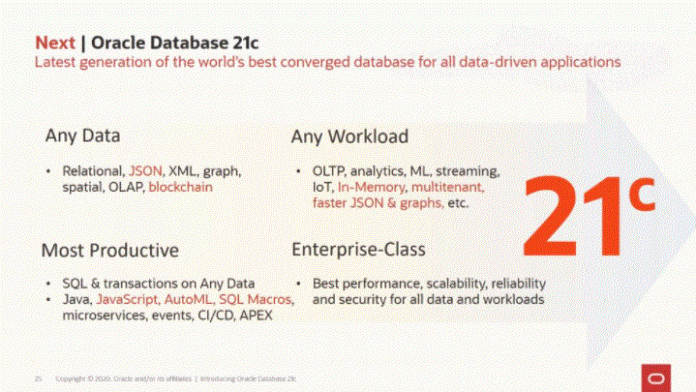Oracle Database 21c will be soon available first on Oracle Cloud: from the Database Cloud Service and the Autonomous Database Free Tier.
Here is a preview of what we can expect as new features:
1. You can enable automatic indexing at the table level:
The AUTO_INDEX_TABLE configuration setting specifies tables that can use auto indexes. When you enable automatic indexing for a schema, all the tables in that schema can use auto indexes. However, if there is a conflict between the schema level and table level setting, the table level setting takes precedence.
Here is an example of how to instruct Oracle to create auto indexes on the NDA_DOCS table:
exec DBMS_AUTO_INDEX.CONFIGURE(‘AUTO_INDEX_TABLE’,’NDA_DOCS’,TRUE);
If I would like to add the NDA_DOCS table to the auto index exclusion list, I simply run:
exec DBMS_AUTO_INDEX.CONFIGURE(‘AUTO_INDEX_TABLE’,’NDA_DOCS’,FALSE);
If later, I decide to remove it from the exclusion list, I will run:
exec DBMS_AUTO_INDEX.CONFIGURE(‘AUTO_INDEX_TABLE’,’NDA_DOCS’,NULL);
And if at one point, I decide to remove all the tables from the exclusion list, so that all the tables in the database can use auto indexes, I will execute:
exec DBMS_AUTO_INDEX.CONFIGURE(‘AUTO_INDEX_TABLE’,NULL,TRUE);
In Oracle 20c and below, you will get the following error message: ORA-38133: invalid parameter name AUTO_INDEX_TABLE specified.
2. Attention Log
The attention log which is unique for each database instance is according to the documentation “structured, externally modifiable file that contains information about critical and highly visible database events”.
We can use the attention log to quickly access information about critical events that need action.
The attention log has the following attributes:
– Attention ID: A unique identifier for the message.
– Attention type: The type of attention message. Possible values are Error, Warning, Notification, or Additional information. The attention type can be modified dynamically.
– Message text
– Urgency: Possible values are Immediate, Soon, Deferrable, or Information.
– Scope: Possible values are Session, Process, PDB Instance, CDB Instance, CDB Cluster, PDB (for issues in persistent storage that a database restart will not fix), or CDB (for issues in persistent storage that a database restart will not fix).
– Target user: The user who must act on this attention log message. Possible values are Clusterware Admin, CDB admin, or PDB admin.
– Cause
– Action
Here is an example from Oracle:
3. For Oracle Autonomous Database, the size of the sequence cache is dynamically computed based on the rate of usage of sequence numbers:
“The automatic sequence cache size on each instance is dynamically computed based on the rate of usage of sequence numbers. Each instance caches the maximum of the manually configured sequence cache size and the projected cache size requirement for the next 10 seconds. Based on the sequence usage, the sequence cache size can shrink or grow. The minimum size to which the cache can shrink is the manually configured cache size. To prevent the sequence cache size from growing indefinitely, the cache size and each increment in the cache size is capped.”
4. Traditional auditing is now deprecated and Oracle recommends that we use unified auditing instead.
5. REMOTE_OS_AUTHENT is now desupported – in fact it was deprecated in Oracle 11.1 and afterwards retained only for backward compatibility.
The New Features 21c Guide lists also the following features which you can use also in Oracle 20c:
– Blockchain Tables
– Database Resident Connection Pooling (DRCP) can be configured at the PDB level:
Connected to:
Oracle Database 20c EE High Perf Release 20.0.0.0.0 – Production
Version 20.2.0.0.0
SQL> exec DBMS_CONNECTION_POOL.START_POOL();
PL/SQL procedure successfully completed.
SQL> exec DBMS_CONNECTION_POOL.STOP_POOL();
PL/SQL procedure successfully completed.
– Transportable tablespace jobs can be restarted:
expdp system/password attach=jmd_exp_20c
Export> continue_client
– In Oracle Cloud environments, a PDB can be downsized by reducing the value of the CPU_MIN_COUNT parameter. The default value for JOB_QUEUE_PROCESSES across all containers is automatically derived from the number of sessions and CPUs configured in the system. It is the lesser value of:
CPU_COUNT * 20
SESSIONS / 4
– The IGNORECASE parameter for the orapwd file is desupported and all newly created password files are case-sensitive.
– SecureFiles segments can be shrunk for improving performance.
Read MoreJulian Dontcheff’s Database Blog


